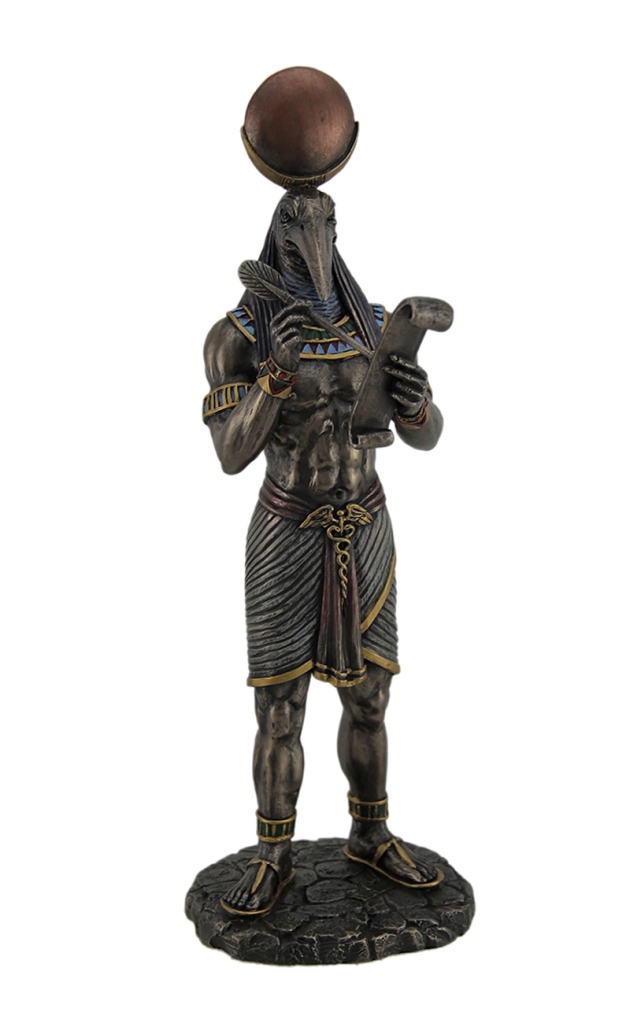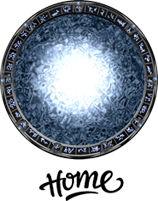Thoth Egyptian God of Writing and Wisdom with Papyrus Statue
This Egyptian God Thoth Statue is intricately sculpted in cold cast bronze in striking mythological detail. Mixing bronze powder with resin gives the piece an authentic metal appearance and you’ll marvel at the colored details that bring Thoth to life. A finely crafted and highly detailed work of art, great as a gift sure to excite any Mythology or Egyptian lover. In this highly detailed statue, Thoth is artistically captured writing on papyrus as the inventor of the written word. Thoth is an ancient Egyptian deity. In art, he was often depicted as a man with the head of an ibis or a baboon, animals sacred to him. His feminine counterpart was Seshat, and his wife was Ma’at. He was the god of the moon, wisdom, writing, hieroglyphs, science, magic, art, and judgment. His Greek equivalent is Hermes. Thoth’s chief temple was located in the city of Hermopolis. Later known as el-Ashmunein in Egyptian Arabic, it was partially destroyed in 1826. In Hermopolis, Thoth led “the Ogdoad“, a pantheon of 8 principal deities, and his spouse was Nehmetawy. He also had numerous shrines in other cities.
Thoth played many vital and prominent roles in Egyptian mythology, such as maintaining the Universe, and being one of the 2 deities (the other being Ma’at) who stood on either side of Ra‘s solar barque. In the later history of ancient Egypt, Thoth became heavily associated with the arbitration of godly disputes, the arts of magic, the system of writing, and the judgment of the dead. The Egyptian pronunciation of dhwty is not fully known, but may be reconstructed as dihautī. This reconstruction is based on the Ancient Greek borrowing Thōth or Theut and the fact that the name was transliterated into Sahidic Coptic variously as Thoout, Thōth, Thoot, Thaut, Taautos, Thoor, as well as Bohairic Coptic Thōout. These spellings reflect known sound changes from earlier Egyptian such as the loss of “d” palatalization and merger of “h” with h i.e. initial dh > th. The loss of pre-Coptic final y/j is also common. Following Egyptological convention, which eschews vowel reconstruction, the consonant skeleton dhwty would be rendered “Djehuti” and the god is sometimes found under this name.
However, the Greek form “Thoth” is more common. According to Theodor Hopfner, Thoth‘s Egyptian name written as dhwty originated from dhw, claimed to be the oldest known name for the ibis, normally written as hbj. The addition of -ty denotes that he possessed the attributes of the ibis. Hence Thoth’s name would mean “He who is like the Ibis“, according to this interpretation. Other forms of the name dhwty using older transcriptions include Jehuti, Jehuty, Tahuti, Tehuti, Zehuti, Techu, or Tetu. Multiple titles for Thoth, similar to the pharaonic titulary, are also known, including A, Sheps, Lord of Khemennu, Asten, Khenti, Mehi, Hab, and A’an. In addition, Thoth was also known by specific aspects of himself, for instance the Moon God Iah-Djehuty, representing the Moon for the entire month. The Greeks related Thoth to their God Hermes due to his similar attributes and functions. One of Thoth’s titles, “Thrice great“, was translated to the Greek (Trismégistos), making Hermes Trismegistus. Thoth Egyptian God of Writing and Wisdom with Papyrus Statue measures: 3.75 inches / 9 cm x 3 inches / 7.5 cm x 11 inches / 28 cm.
Egyptian God Thoth Statue on Amazon.
Egyptian God Thoth Statue on eBay.
Egyptian Statues, Gods Statues and Mythological Statues.



